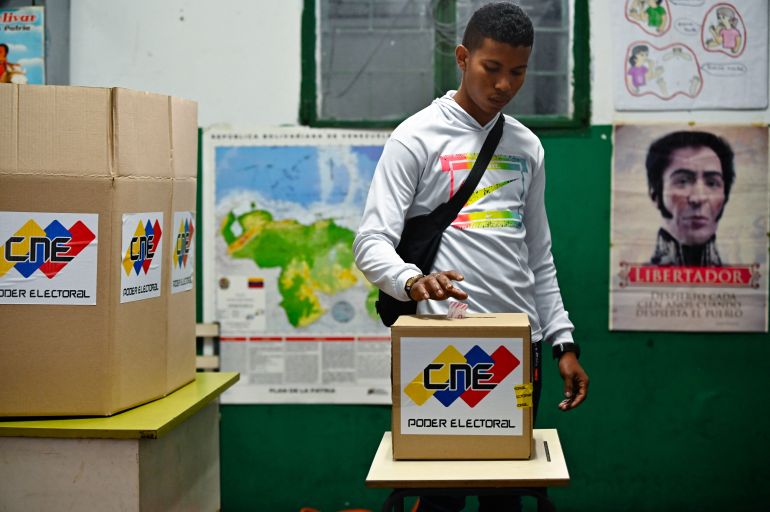According to the electoral authority of Venezuela, the ruling coalition, led by President Nicolas Maduro, has maintained a significant majority in the country’s powerful National Assembly.
In response to what they described as fraudulent results of the presidential election in July 2024, several opposition groups called for a boycott of the Sunday legislative and gubernatorial elections. The 2024 election’s winner was determined to be Maduro.
The 285-member assembly elects members of the ruling United Socialist Party of Venezuela (PSUV), who will continue to hold control of important institutions like the attorney general’s office and the supreme court.
What are the key details for parliamentary and regional elections:
What were the 2025 regional and legislative elections’ official results?
The PSUV and its allies received 82.68 percent of the votes cast the day before for seats in the National Assembly, according to preliminary results released by the National Electoral Council (CNE) on Monday.
According to the CNE, the ruling coalition also seized 23 of the state governor’s positions.
In a declaration released on state television, CNE rector Carlos Quintero claimed that an opposition alliance won 5.17 percent of the vote while a coalition that is close to the ruling socialist party won 6.25 percent.
The election results “proved the power of Chavismo,” the left-wing, populist political movement founded by his predecessor, Hugo Chavez, according to Maduro, who hailed them as a “victory of peace and stability.”
What was chosen by voters?
The CNE was in charge of the election of 260 state legislators, 285 members of the unicameral national assembly, and all 24 governors, including the newly established governorship, which is supposed to have been established to administer Essequibo, a region that Venezuela and neighboring Guyana have long been at odds with.
Cojedes state’s governorship was won by opposition candidates, down from the four they won in 2021.
Why was the election in the disputous Essequibo region close to Guyana contentious?
In a colonial-era contentious dispute between Caracas and Guyana, the Venezuelan government changed the electoral boundaries to elect a governor and eight representatives for the oil-rich Essequibo region.
In Venezuela’s Bolivar state, which has 21, 403 voters, and is located along the Guanese border, the vote was carried out. For the legislative and regional elections taking place on Sunday, Caracas had created it specifically. In Georgetown’s 160, 000 km2 (61, 776 km2)-adjacent Essequibo territory, there were no polling stations.
Guyana has ruled the area for a long time, but Maduro repeated on Sunday that Caracas had threatened to annex it. Before the vote, the Guyanese government warned that voting in Venezuela’s election could lead to treason.
Despite the ongoing legal battle at the International Court of Justice (ICJ), the Maduro government passed a law last year to create a new state in the disputed territory. Venezuelan actions come in spite of a court order from 2023 mandating Caracas to abstain from any change to the territory’s status quo.
The Venezuelan government has stated that it disapproves of the court’s authority in the matter.
What was the opposition’s response to the outcomes?
Up to 85% of eligible voters in some areas of the nation voted against the election, according to Maria Corina Machado, a figurehead of the opposition, in a post on X late on Sunday. She criticized the election as an “enormous farce that the regime is trying to stage a burying of its defeat” in the election of last year.
We saw an event that attempted to disguise itself as an election, but failed to deceive the country or the world, according to Edmundo Gonzalez, who is recognized by the United States and several other nations as the winner of the July 2024 presidential election.
“What the world saw today was a civic act of courage,” the statement read. In a post on X, he wrote, “A silent but powerful declaration that the desire for change, dignity, and a future remains intact.

Another opposition group, led by two-time presidential candidate Henrique Capriles and governor of Zulia state Manuel Rosales, urged people to cast ballots to stop the opposition from being given complete control of the state.
Rosales lost his governor’s seat, while Capriles was elected to the National Assembly.
What factors and characteristics influenced voter turnout?
The CNE estimates that 8.9 million people cast ballots, or roughly 42 percent of the 21 million eligible voters.
However, the country’s main opposition leaders had urged voters to boycott the election in protest of the presidential election held in July 2024.
What effects will these elections have on Venezuela’s political landscape?
The outcomes give Maduro a significant boost as he gains even more power as the ruling coalition, which currently has almost complete control over the democratic institutions, gains.
Omar Barboza, the executive secretary of the opposition’s Democratic Unitary Platform (PUD), will step down in March, which will demoralize the opposition, which has been in disarray. One of the reasons for resigning from his position weeks before the elections was cited by Barboza as a lack of cohesion.
Teresa Bo, a journalist from Argentina, reported for Al Jazeera that Maduro faced a difficult task of challenging him with more forceful force during the campaign because there was a rift between the opposition and the boycott call.
She continued, noting that the majority of analysts “could not guarantee if the elections were free and fair.” She said, “They also spoke out about the lack of international observers.”
What will Maduro do after that?
Despite years of mismanagement and international sanctions, Maduro’s victory in recent elections comes despite the economy’s decline.
Venezuelan oil is currently being pumped by US President Donald Trump, potentially depriving Maduro’s administration of a crucial economic lifeline.
After Maduro agreed to work with the opposition to a democratic election, Joe Biden received a license to Chevron in 2022.
Source: Aljazeera

Leave a Reply